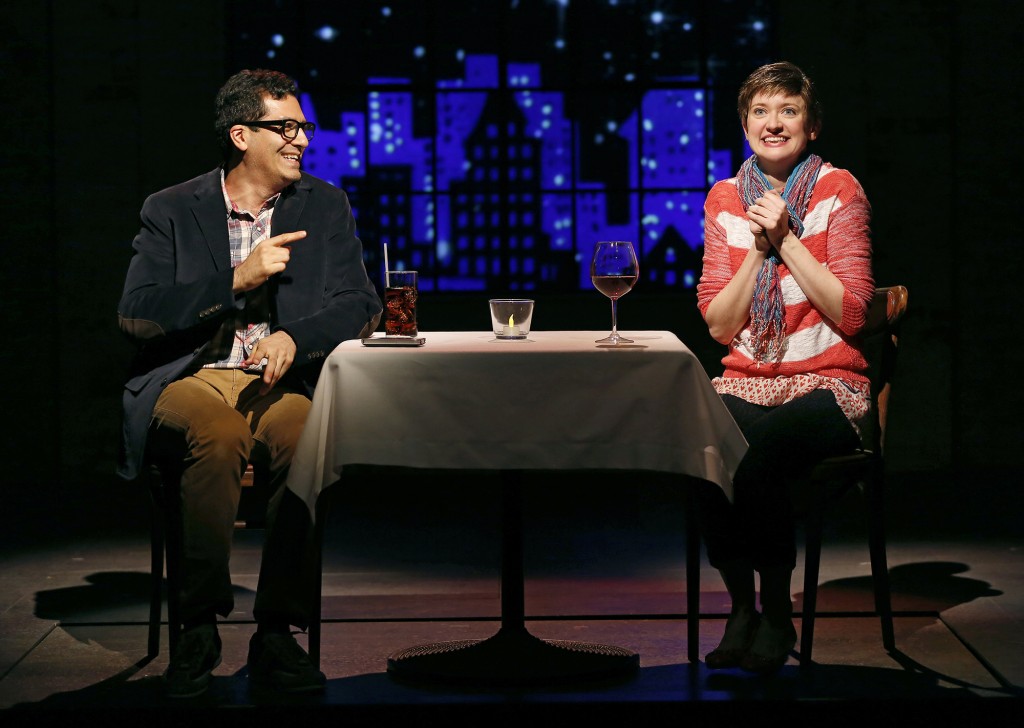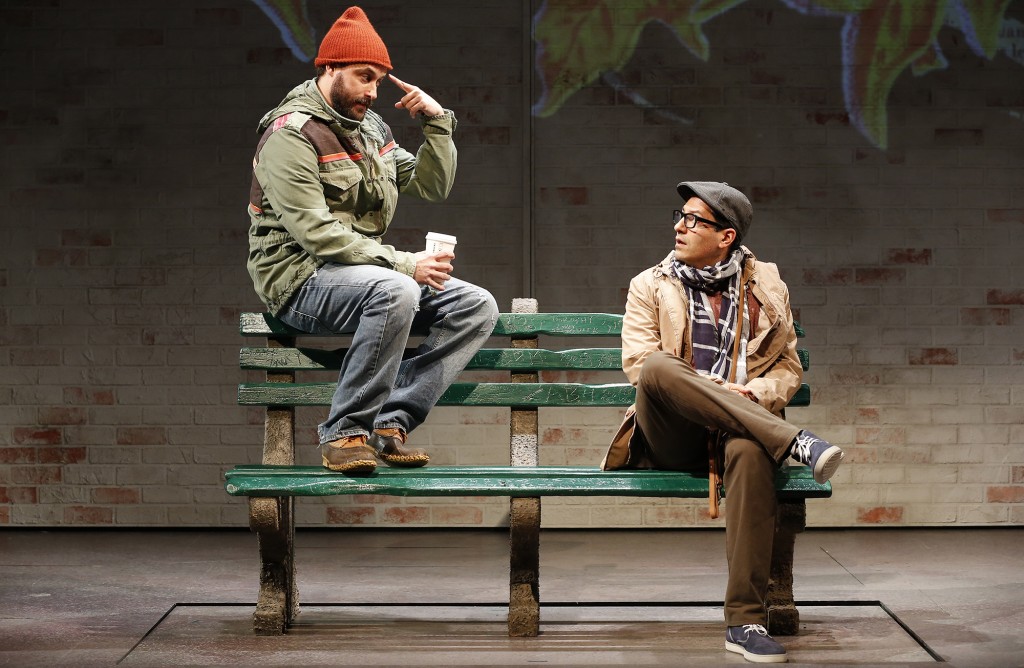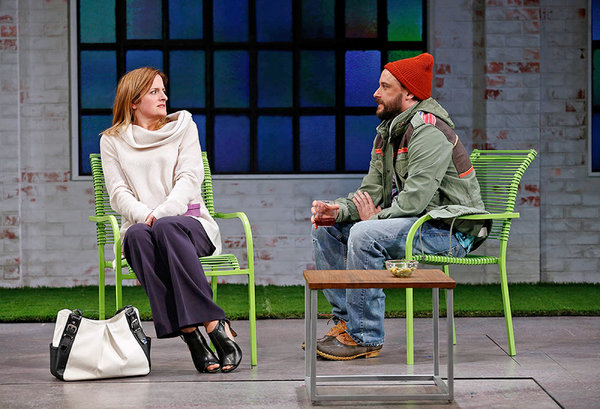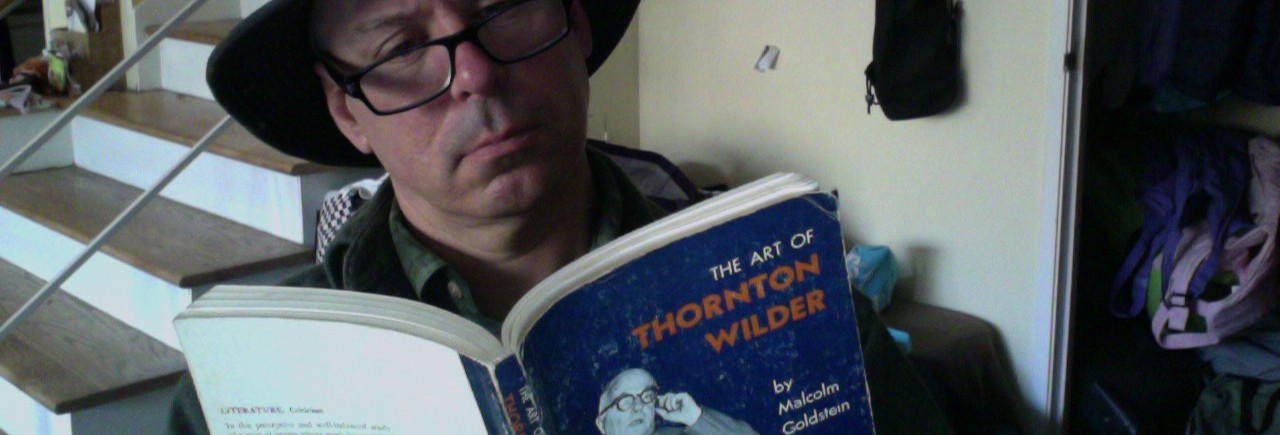Elevada
By Sheila Callaghan. Directed by Jackson Gay. Through May 16 at the Yale Repertory Theatre, corner of York and Chapel streets, New Haven. (203) 432-1234.

Elevada is what is commonly known as a smart modern romantic comedy. It takes cliches of the form and gives them clever twists. Ultimately, it’s those cliches and familiar formats that carry the play along. It’s the danger elements—casting choices that avoid stereotypes, dance used in lieu of dialogue, patience-testing recountings of Seinfeld sitcom scenarios—that make Elevada memorable.
The first scene doesn’t promise much. It’s the first-date set-up from countless one-acts. The second scene, where the characters reveal themselves to be crazy, insecure or both, hearkens to such modern-love staples as Durang’s Beyond Therapy or Mamet’s Sexual Perversity in Chicago. But something unexpected has been revealed (and since a number of other critics are keeping the secret, so shall I) that elevates Elevada above romance into a mirth-filled musing on the meaning of life.
Sheila Callaghan, not known for upbeat or traditional writings—her Women Laughing Alone With Salad, for instance, creates characters out of online photo memes—follows a clear dramatic path here and unleashes some solid comedy zingers:
“I have a charismatic digestive system.”
“I’m not used to alienating people in person.”
“You’re fake-texting!”

The results are neither conventional nor satirical. There are genuine emotions being revealed here, in genuinely revelatory ways. The four central characters come from popular stock: the miserable loner who’s tricked into a blind date; his wacky friend; the awkward young women who deliberately drives worthwhile suitors away; and her tightly wound sister. Oh yeah, and it’s all set in the all-too-common theater setting of “New York City, now.”
But Elevada sets you up comfortably only to confound you, in a good way, and set your mind reeling regarding how much it takes to make a realtionship work these days. It accepts urban realities of stress, isolation and social awkwardness. It also, admirably, touches on modern political issues like corporate identity, the economy, and healthcare, fusing them cleverly with the romantic plotline.
This kind of thing is more difficult to play than it looks—especially when all the characters have been cast with actors who, it could be said, are not the types which Central Casting would likely put up for such roles. This is another thoughtful and positive aspect of Elevada—though it is set in New York and refences Seinfeld, it does not act like Seinfeld… or Friends or Woody Allen movies or The Honeymooners for that matter. The two main lovers, Ramona and Khalil, and played by Laurel Casillo and Alfredo Narciso. She could go the thin anxious shrill route, but decidedly doesn’t. He could do the babbling bespectacled geek thing but pulls way back from that. They have moments of strength and weakness, slaloming past stereotypes all the while. It’s a little more difficult for Keira Naughton (as Ramona’s sister June) and Greg Keller (as Khalil’s pal Owen) to avoid the cliched sidekick traps (and I do worry that Keller, after playing similarly esteem-impaired parts at the Rep in War and Belleville, needs to be cast in some heroic part lest he wallow in comical despair for the rest of his career), but they do transformative things with what they’re given.

As for those topical elements, Elevada has things to say about modern society that are more important than the usual “social networking is killing human interaction” rants that fuel most romantic yarns these days. This is genuinely a play about identity and self-worth, about building up one’s own image of oneself but remembering that others care about you too. Some of the subplot concepts—if a corporation can be a person, can a person disappear into a corporate-made image?—are worth a play in themselves, and the constant pop-culture markers (brand name after brand name after brand name) which Callaghan drops into the dialogue give Elevada some sense of noncomplacent here-and-now.
Elevada may use certain sturdy dramatic crutches to keep its plot moving, but there’s no such safety net in its casting or directing or indeed, its design, which uses flashy projections to illumine settings that are as commonplace as an apartment living room, a rooftop, a waiting room or a coffee shop. There’s a simultaneous ordinariness and flashiness to the whole enterprise—entirely suitable for such manic emotions as love, fear and anguish.
Then there’s the terpsichore. Such an ingenious element that it can’t help but feel underused, a troupe of five local dancers are utilized as scene-changers, bit-players and abstract fantasy elements. These movement elements are inventive and extravagant—the choreographer is Kyle Abraham, the MacArthur Grant winner whose troupe abraham.in.motion played the International Festival of Arts & Ideas a few years back—but fit smoothly with Sheila Callaghan’s dialogue and the conventional romcom form.
Abraham’s choreography builds neatly upon the swift and graceful direction of Jackson Gay, who (as seen most recently at the Rep in These Paper Bullets!) can make
The Yale Rep has regularly experimented with modern romance scripts in the past couple of decades—The Mistakes Madeline Made, Happy Now, right up to Danai Gurira’s Familiar earlier this season. These shows tend to be distinguished by harsh present-day realities stuffed neatly into accessible, often adorable packages. Sometimes they have topical issues that overwhelm the idea of “romantic comedy,” but that romance is nonetheless essential to the drama.
Elevada has a lot of opinions to spout. Its characters are intelligent and driven, and interestingly hampered by emotional issues or (in one case) addictive behavior. Some incredible leaps of sanity and logic are made workable by the play’s upbeat, friendly and familiar framework. Yes, Elevada elevates.
Previous Post: Sorry I haven’t blogged
Next Post: Come on in, Carlotta’s fine
